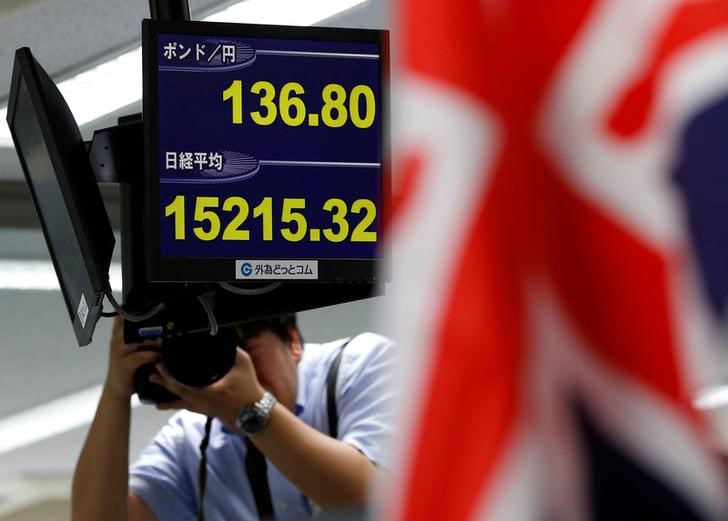By Dhara Ranasinghe
LONDON (Reuters) - The dollar climbed to its highest level in almost 14 years against a basket of currencies on Friday, while U.S. bond yields were set for their biggest fortnightly rise in 13 years on bets U.S. inflation and interest rates are headed higher.
A growing perception that the economic policies of U.S. President-elect Donald Trump will push up consumer prices helped put the dollar on track for its biggest two-week rise against Japan's yen in almost 30 years.
European shares nudged down <.GDAX> (FTSE) (CAC) and U.S. stock futures (ESc1) pointed to a flat open for Wall Street.
In Asia, MSCI's broadest index of Asia-Pacific shares outside Japan (MIAPJ0000PUS) slipped 0.4 percent to hover just above four-month lows touched earlier in the week. It logged its fourth straight week of losses.
The dollar's rise against the yen
Data on Thursday suggesting the U.S. jobs market is tightening and inflation is gaining traction have bolstered a view that U.S. growth and inflation could accelerate if the Trump administration cuts taxes and increases fiscal spending.
Last week's unexpected U.S. election result has prompted investors to ditch their once rock-solid conviction that growth in developed economies will remain tepid because of tough competition from emerging market economies with lower wages.
That has led to a repricing of assets, most notably in currency and bond markets.
"What we're looking at is a broad shift of investment back to the U.S.," said Richard Cochinos, Citi's head of G10 currency strategy in London.
"There are expectations for tax cuts next year - which were part of the Trump campaign's promises - and then there's also the idea of what type of fiscal boost are you going to have. That's what's driving asset prices – it's people's expectations for the fiscal impulse next year," he said.
Federal Reserve policymaker James Bullard said on Friday he is leaning toward supporting a rate rise in December, adding that a plethora of potential changes under Trump could affect future policy.
BONDS RUMBLED
The 10-year U.S. Treasury yield (US10YT=RR) rose to 2.34 percent, its highest since December. It is up about 51 basis points over the last two weeks - the biggest fortnightly rise in 13 years.
Global bond indices are set for their biggest two-week loss in decades in a sign that a three-decade bull run for fixed income could be at a turning point.
Barclays Global Aggregate Bond Index is poised to record a 4 percent loss over the last fortnight <.BCGA>, its steepest fall since at least 1990, according to Reuters data.
In Europe, Italian bonds <IT10YT=TWEB> have borne the brunt of selling as investors fret about the political repercussions of a referendum next month that could further destabilize a country battling a banking crisis and a weak economy.
Italian banking stocks came under renewed pressure on Friday from referendum jitters. Italy's bank sector index (FTIT8300) fell as much as 4.2 percent to its lowest level since October 5.
Following Trump's election win, there was also some focus on France, where the vote for the conservative candidate for the French presidency takes place this Sunday.
Rising bond yields across the globe also reflect a reassessment of the Federal Reserve's policy path down the road, beyond a likely rate hike in December.
Fed Chair Janet Yellen said on Thursday that Trump's election has done nothing to change the Fed's plans for a rate rise "relatively soon."
Money markets are starting to price in one or more rate hikes next year, a sea change from before the election when they priced in a less than 50 percent chance of a 2017 rate hike.
The dollar rose to 110.92 yen <JPY=>, its highest level since last May. The euro <EUR=> slumped to $1.0583, a low last seen almost a year ago.
The dollar's index against a basket of six major currencies (DXY), <=USD> rose to 101.37, its highest level since April 2003. It has risen over 4 percent in the last two weeks, its biggest fortnightly rise since March 2015.
WEAK EMS
A rising dollar is a problem for some emerging economies that could see potentially destabilizing capital outflows.
The Turkish lira
The Mexican peso <MXN=>, a lightning rod for market anxiety over Trump, more than matched the lira's fall. Investors were disappointed the central bank raised rates by only 50 basis points to 5.25 percent on Thursday to stem the sell-off, which saw the currency plunge to record lows after the election.
Gold <XAU=> fell to a 5-1/2-month low of $1,203.52 per ounce on the back of a stronger dollar.
Brent crude oil prices <LCOc1 > were set for their first weekly gain in five on renewed hopes that OPEC might agree production cuts, but a stronger U.S. dollar capped gains.

For Reuters new Live Markets blog on European and UK stock markets see reuters://realtime/verb=Open/url=http://emea1.apps.cp.extranet.thomsonreuters.biz/cms/?pageId=livemarkets